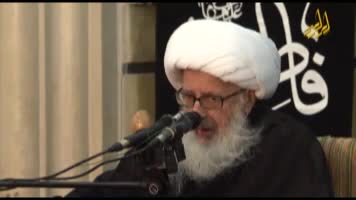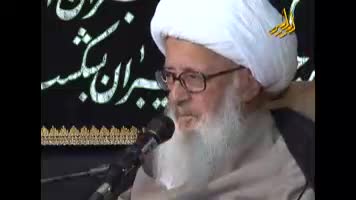we should discuss regarding Imam Ali ibne Moosa Ar-Reza(a.s)
though this discussion is very difficult, however, to the best of our abilities
discussion about him is discussion about the reality of the Quran.
The assembly also is the Assembly of the Quran
However, understanding his personality is beyond our reach
Imam (a.s) is to be identified and understood when
All praise is due to Allah, the Lord of the worlds. And His blessings be on our leader Prophet Mohammad( pbuh) and his Pure Progeny (a.s) particularly on His Hujjat(a.s) on the lands. And may His curse be on all their enemies till the Day of Judgement.
Our discussion was regarding the alphabets of the Quran.
And the discussion regarding "alif" had not ended.
However, today since a group wanted that
we should discuss regarding Imam Ali ibne Moosa Ar-Reza(a.s)
though this discussion is very difficult, however, to the best of our abilities
discussion about him is discussion about the reality of the Quran.
The assembly also is the Assembly of the Quran
However, understanding his personality is beyond our reach
Imam (a.s) is to be identified and understood when
humanity and its perfection is realized
That is when we shall know as to who he is that
he is able to deliver creation to their aim of creation.
All this creation and all the universe is the starting point for the (understanding of) man
Understanding the Quran is very difficult
" We shall soon show them our signs in the heavens and in their beings."
Man is on one side of the balance
and all the universe on the other
That is why from the greatness of the prologue
one may understand the greatness of what has to come afterwards
And the greatness of the final aim of mankind
In the Quran the word "tabarak" has come nine times.
However, each one of these has so much depth that
entering this discussion is quite difficult
An example of this is as follows:
There are two surahs in the Holy Quran. Which two surahs?
This in itself entails a long discussion
One is Surah Furqan, one is Surah Mulk.
Men of thinking need to ponder this
see as to how amazing every verse of Surah e Mulk is
What does Surah Furqan talk about!
Each one of these two surahs is preceded by a verse
Each of these two verses is preceded by "tabarak"
Where did God use "tabarak"?
"Blessed is He Who hath revealed unto his slave the Criterion( of right and wrong),
"that he may be a warner to the peoples.
This insufficient time and understanding Imam Reza (a.s)!
How is it possible to reach even a vague cognizance of his.
In Surah e Mulk, "In the name of Allah, the Most Beneficient, the Most Merciful,
"Blessed is he in Whose hand is the Sovereignty
"and He is Able to do all things.
"Who hath created life and death."
and afterwards is a pandemonium
when it reaches the creation of man
it tells about the seven stages of creation
If man is not understood Imam Reza shall not be understood
Man has seven stages,
The first stage begins from:
" Verily, we created man from a product of wet earth."
the seventh stage: "Then We brought about another creation in him( We gave him the Spirit)."
And after this seventh stage: "So blessed be Allah, the Best of Creators."
This is the way " tabarak" has been used
That (Tabarak) in Surah Mulk, and
that (Tabarak) in Surah Furqan, and
that (Tabarak) in Surah Mominoon, all these need to be brought together
Here Allah says:
"So blessed be Allah, the Best of Creators."
This is man!
So what is the perfection of man?
Perfection of man is summed up in two words:
These two words are: one is 'Aql' (wisdom and intellect) and the other is 'Eeman' (faith)
This is the crux of all revealed and human knowledge.
The perfection of creation: man
the perfection of man: 'aql'(wisdom) and 'eeman'(faith)
The Eighth Imam(a.s) has two ahadith
One about wisdom, one about faith
In each of these traditions, in every sentence he has been amazing
This is when the Eighth Imam(a.s) is identified
Ibn e Sikkit is someone that Ibn Khalkan writes about his book:
"This is a book that has no parallel and is a reference for all."
Such a person came and near the Imam(a.s) knelt on the floor and said:
" O Son of the Prophet (pbuh) of God! What is the Hujjah (proof), today?
The Imam said: "Wisdom"
This is understood by those who
have studied all the rational, theoretical and practical sciences
from the beginning till the end
then would they understand what the Imam(a.s) told Ibn e Sikkit.
Said: Hujjah is Wisdom
Later in another tradition he explained the perfection of 'aql'(wisdom) that
what is the perfection of wisdom
These should be understood, that is when it will be understood that
what sort of knowledge and wisdom the world has been deprived of
Said: "The wisdom of one is not perfected without these things:"
We shall tell a small part of it summarily
"First, goodness is expected from him.
What a word he has started with
the first sentence starts with "khair"(goodness)
This is why the understanding and perception of these ahadith is very difficult
" Goodness is expected from him and evil is not foreseen from him."
He(a.s) has taken two words: "Khair"(goodness) and "sharr"(evil)
alif' and 'laam' has preceded both these words. 'Alif' and 'Laam' denoting the inclusion of 'all good' and 'all evil'.
All good is expected from him;
No evil is foreseen from him.
We have said that every sentence entails a long discussion
The eighth Imam(a.s) is identified and perceived in these sentences
"Second, once he has passed this station,
"He reckons abundance of good from himself insufficient
"and reckons the meager good from the other abundant
this is how wisdom is perfected
he is not frustrated if invoked to help people
"When people invoke him for help frustration does not overcome him.
This is regarding creation
However, regarding himself:
"He does not get satisfied from seeking knowledge throughout his life."
What has he done in every sentence
after that he says: "Poverty for Allah is dearer to him than wealth."
" Humiliation for Allah is dearer to him than respect and honour."
This is how he nurtures that quintessence of humanity.
" The foundation of man is 'Aql'(wisdom)"
This seed should reach fruition under the guidance of this gardener.
The tradition is detailed. I shall tell its last part.
Since himself focused on the last sentence
Said: " The tenth and what is the tenth thing?"
That last is this:
"He does not see anyone
this word "no one" is so inclusive
" He does not see anyone but says he is better than me.
"If he reaches here wisdom is perfected."
Why? He analyzed this afterwards.
" Because everyone you see is not without these two states.
" Either he is better than you or worse.
" That someone who is worse, once you reach him
" his evil is evident but maybe there is good that is hidden from the eyes of the people.
"however, your good is evident for yourself
"Maybe that hidden good from him is acceptable in front of God
" And that hidden evil of yours might cause you to be ostracised
"and that apparent good from you as well is not acceptable.
"When it is so that evil person is better than me.
The gist of the matter is this:
Those who know
regarding themselves have 'knowledge of naught'
regarding others have 'no knowledge'
No knowledge' with 'knowledge of naught' do not conflict with each other
This is when wisdom is perfected
However, if you see he is better
you should follow him in such a way that you reach every good
If it is like this, wisdom is perfected
This is his word regarding the perfection of wisdom.
When he reaches faith(eeman)…..
Who it is who is sleeping in Toos? Who is it!
When he reaches faith, he said:
" A believer's faith is not perfected unless he has three practices
One from God; second from the Prophet( pbuh) of God; third from the Immaculate Imams(a.s)
However, the one from God: " Hiding secrets"
A believers faith is completed once he
learns from God hiding defects
he should safeguard secrets
again in this word there is a pandemonium!
What does it mean to take " hiding secrets" from God?!
However, from the Prophet(pbuh) of God he should take "affability of manners".
What did he do?
See that his teeth were broken and
cinder was thrown on his head and
he was the best of creations
they treated him like this, afterwards he said:
" O Allah! Guide my people for they do not know."
In return for all the pain he endured from those people he prayed for them.
That too what did he ask from God?
" O God! Guide my people….."
Then it is extraordinary here
After the word " O God! Guide" we have " my people"
He related those people of the Arabian peninsula to himself so as to safeguard them from the tribulation of God.
Afterwards, that which amazes the intellect is
lastly he excused for them himself
gave a reason, said: "…..since they do not know"
forgive these for they do not know. Accept their excuse
Take affability of manners from here. Then you should be a believer.
However from us(the Imams as): " Patience in hardship and loss."
With these three phrases man will reach the ultimate end of creation.
All the scholars of ethics from Aristotle till present
That which all the men who have worked towards for the upbringing of man, has three stages
The first stage: Takhliyye (Emptying)
The second stage: Tajziyye (Analysis and separation)
The third stage: Tahliyye (Ornamenting)
He has combined all the three stages in two traditions!
He has removed all the faults of the practical knowledge of the world with these two traditions.
If his sayings were researched and explained
were understood and were utilized
two traditions of his would have changed the world
is understanding such a person easy?
This tradition has been narrated by Ali ibn Ibrahim from Ibrahim ibn Hashim,
He from Ibn Abi Umair, Ibn Abi Umair from a few companions
from Umer ibn Yazeed from Imam As-Sadiq(a.s)
A tradition such as this! With a chain of transmitters like these!
Imam (a.s) said: " One Hajj is equal to freeing seventy slaves."
Then Umer ibn Yazeed….
Those who are students of jurisprudence should identify the narrators
in jurisprudence it is important as to who that narrator is.
Whether its Umer ibn Yazeed, Muawiyya ibn Ammar, Zarareh or Abu Baseer?
he asked: Is there something like Hajj?
Imam(a.s) said: "There is nothing like Hajj.
One Dirham for Hajj is equal to two million dirhams spent for other than Hajj in the way of God."
Remember this tradition well
The three Shiekhs, that is Thiqat ul Islam Shiekh Kulaini
Shiekh ut-Taife in Tahzeeb,
Shiekh ul-Muhadditheen Saduq in Ayun and Amali
The tradition that is reported by the three Shiekhs……
a part of it is this:
the Seventh Imam(a.s) said: "Ziyarah of my son Ali…..
pay special attention
" Ziyarah of my son Ali is better than 70 accepted Hajj."
That Hajj with that greatness!
A Ziyarah of his is equal to, lies in the same balance as
seventy accepted Hajj. That too not every Hajj! (In the other balance)
This is the first sentence,
Then it does not stop here, the Imam(a.s) said:
" Somebody who performs his ziyarah, stays for one night near his grave
"… he is like one who has visited Allah in His throne."
These are the words of someone whose truth is attested to by God!
… he is like one who has visited Allah in His throne.
In the second stage he said:
" When the throne of Allah on the Day of Judgement is brought there are eight people
" Four people from the foremost and four people from the final-most
from the foremost: Noah, Abraham, Moses and Jesus;
from the final-most: The Prophet(pbuh), Ameer ul Momineen, Hasan Ibn Ali, Hussain Ibn Ali
This in itself has a secret
After this sentence he said:
" the pilgrims to the graves of the Imams are seated by the side of the Imams
however, "of them the pilgrims of the highest stature and the nearest ones as a gift( from God) are the pilgrims to the grave of my son Ali."
This is Imam Reza(a.s)
"" the pilgrims of the highest stature" and closest of them as a gift of God are the pilgrims to the graves of Ali ibn Musa Ar-Reza!"
To understand the Eighth Imam is beyond man
So what are the qualities he has?
end of the conversation
since people must know what is going on
It is sad that we did not understand! We did not comprehend in whose shadow this country is still going on
you sent blessings for an age
what did you say in those blessings
Who are the family of Muhammad(pbuh)
Pay special attention
Then the hadith is this
The Sixth Imam(a.s) who is the patron and head of religion, told his son the Seventh Imam(a.s)
"In your loins is the scholar of the family of Muhammad(pbuh)"
Once it is said the scholar of a people
Once it is said the scholar of a particular group
however the words are these
Infact these words are surprising for the intellects
His second sentence is more perplexing
Somebody who has no wish but God
Somebody who has reached a stage that
who says, " Only ye do we worship and only ye do we ask for help," so much that hears it from God himself
such a person told his son
think as much as you can!
after that said: " I wish I was alive and saw your son."
O Allah send your blessings and peace on your Friend and Hujjah Ali ibn Musa Ar Reza(as)
as much as your knowledge encompasses
blessings that are continuous with the continuation of your power and territory.



